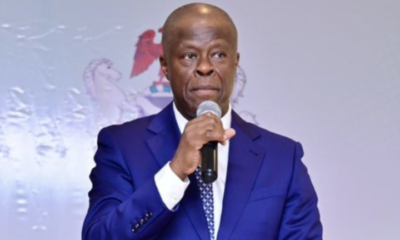News
Ebocha Explosion: Host Communities Bemoan Devastation …As Agip Loses 1.5m Barrels Of Crude

L-R: President General, Bakana Community Development Association, Mr Iloye Braide, Prof. Victor Omuaru and Rivers State Deputy Governor, Dr Ipalibo Banigo, during the association’s courtesy visit to the Deputy Governor in Port Harcourt, on Wednesday
Host communities of Nigerian Agip Oil Company (NAOC), the Italian oil prospecting giant are now groaning in pains, tears and fear apparently due to the explosion of three massive reservoirs containing several hundreds of thousands of crude oil.
The indigenes of the area are particularly crying foul following non-delivery of relief materials to them, four days after the blasts which devastated the environment, destroying flora and fauna.
The communities, whose environment was impacted include: Mgbede, Okwuzi, Aggah, Abacheke, Abaezi and Etekwuru, spreading across two states, Rivers and Imo, where acquatic life, farms, livestock and human beings are at risk due to emissions occasioned by the tragedy.
The Tide investigations revealed that the oil production from the Ebocha facility, which stood at 22,000 bpd before the blast, had been stalled, and workers were seen milling some distance from the facility, waiting for orders from above on the next line of action.
While security had been beefed up in the area to forestall violence and protect lives and property, indigenes have been forced to relocate to neighbouring communities, for safety.
Our reporter gathered that the blasts occurred on Sunday and the fire raged till last Tuesday, from three giant tanks, leaving locals to scamper for safety of their lives.
The paramount ruler of the host communities, Mgbede town, Eze Chadinah Ogor told The Tide that the devastation was horrible and that people were thrown out of their beds and comfort homes following the loud noise, smoke and huge flame that enveloped the area.
Ogor noted that since oil prospecting by Agip began in 1968, indigenes have never witnessed such thunderous explosion.
He blamed the disaster on poor maintenance culture of Agip as, according to him, most of their facilities and equipment were obsolete and non-effective.
The monarch called for the re-appraisal of Agip’s operational policy, and also harped on the need for immediate relief materials to cushion the effects of the blasts, as well as remediation of the impacted environment.
Similarly, the Chairman of Ogba/Egbema/Ndoni Local government Area, Mr. Augustine Ahiamadu, who visited the site of the explosions, said the council has contacted the National Emergency Management Agency (NEMA) and Agip to initially assess the impact of the disaster on the people and the environment.
Ahiamadu noted that the council has declared the area as a disaster zone while efforts were in top gear to send relief materials to the people so impacted.
He also called for Environmental Impact Assessment (EIA) of the environment.
In his reaction, a landlord to the Ebocha oil centre, Engr. Nelson Ekperi, lamented the plight of the landlords and other host communities, adding that the tragedy was unimaginable.
The Tide learnt that there was some gaseous emissions at the oil centre, few days to the blasts.
Sources said workers who were working on the facility were masked to avoid inhaling gas.
When contacted, Mr. Ifeanyi Ewule of NAOC’s public affairs department declined comments.
He, however, referred The Tide to his boss, Mr. Etim, who ignored all calls and text messages sent to him on the issue.
But workers at the oil centre, who pleaded anonymity, could not ascertain whether the blasts were caused by equipment failure or sabotage.
However, they contended that Agip may have lost over 1.5 million barrels of crude oil to the tragedy, and equipment worth billions of Naira razed by the inferno.
The Tide learnt that a team comprising the host communities’ representatives, stakeholders, NAOC’s management and other relevant agencies may likely go for the first Joint Inspection Visit (JIV) in the next couple of days.
Goodluck Ukwe
News
Tinubu Appoints Four Nominees Into NCDMB Governing Council

President Bola Tinubu has approved the nomination of four new members to the Governing Council of the Nigerian Content Development and Monitoring Board (NCDMB).
The Special Adviser to the President on Information and Strategy, Bayo Onanuga, in a statement yesterday, said the appointment is to fill existing vacancies and strengthen the board’s capacity.
The statement said the approved nominees are Mr. Olusegun Omosehin of the National Insurance Commission and Engr. Wole Ogunsanya of the Petroleum Technology Association of Nigeria.
Tinubu also endorsed the nomination of Sam Onyechi, who represents the Nigerian Content Consultative Forum and Barrister Owei Oyanbo from the Ministry of Petroleum Resources.
The President encouraged the new members to leverage their expertise and dedication to enhance local content development within Nigeria’s oil and gas industry.
It added, “The nominations arose from the exit of previous institutional representatives from the Governing Council.
“The NCDMB Governing Council, established under Section 69 of the Nigerian Oil and Gas Industry Content Development Act, 2010, comprises representatives from key institutions.
“These include the Ministry of Petroleum Resources, the Nigerian Upstream Petroleum Regulatory Commission, the Nigerian National Petroleum Company Limited, the Petroleum Technology Association of Nigeria, the Council for the Regulation of Engineering in Nigeria, the Nigerian Content Consultative Forum, and the National Insurance Commission.”
News
NDDC To Construct Hostels, Roads In UNIPORT – Ogbuku

The Niger Delta Development Commission (NDDC) has announced plans to construct additional hostels, rehabilitate roads, and enhance power supply in the University of Port Harcourt (UNIPORT).
NDDC’s Managing Director, Dr Samuel Ogbuku, disclosed this during a visit to the commission’s headquarters in Port Harcourt, yesterday by a delegation from the UNIPORT’s Governing Council.
Ogbuku stated that the NDDC had committed to upgrading facilities at UNIPORT as part of efforts to foster partnership with educational institutions across the Niger Delta.
According to him, the implementation of additional projects at the university forms part of a broader strategy to improve education standards in the region.
“Aside from the construction of new hostel blocks and installation of a 300 KVA solar inverter system, the NDDC will also facilitate more projects in the university.
“The commission will also deploy its engineers to assess the condition of UNIPORT’s roads and hostels for potential rehabilitation,” he said.
Ogbuku noted that upon completion, the projects would add to various initiatives previously undertaken by the commission at the university.
“These and other projects reflect our commitment to actualising President Bola Tinubu’s Renewed Hope Agenda in the Niger Delta region,” he added.
He reaffirmed the NDDC’s dedication to fostering development and strengthening partnerships across the region.
Earlier, Sen. Mao Ohuanbunwa, Chairman of UNIPORT’s Governing Council, who led the delegation commended the current leadership of the NDDC for its achievements in accelerating development in the Niger Delta.
He highlighted the university’s infrastructural challenges, noting that it lacked adequate facilities to accommodate its growing student population, and appealed for the NDDC’s support in addressing the shortfall.
“Currently, UNIPORT has a total student population of about 50,000, while its hostel accommodation capacity can only cater for 5,000 students.
“We therefore urge the NDDC to assist in the construction of additional hostels, improve transportation facilities, and facilitate the acquisition of gas turbines to enhance power supply for our students,” Ohuanbunwa pleaded.
The Vice Chancellor of UNIPORT, Prof. Owunari Georgewill, commended NDDC for its impactful projects across the Niger Delta and extended an invitation to the commission to participate in the institution’s forthcoming 50th anniversary celebrations.
News
Senate Rejects Motion To Rename INEC Headquarters After Humphrey Nwosu

The Senate has rejected a motion to rename the Independent National Electoral Commission (INEC) headquarters after the former chairman of the defunct National Electoral Commission, late Prof Humphrey Nwosu.
Nwosu presided over the June 12, 1993, presidential election, which was truncated by the former military President, General Ibrahim Babangida (rtd).
The election which was won by the late business mogul, Chief MKO Abiola, was adjudged to be the freest and fairest in the electoral history of Nigeria.
The motion to rename INEC after Nwosu was re-sponsored by Senator Enyinnaya Abaribe yesterday after lawmakers threw it out last Wednesday.
Abaribe called for posthumous national honours to be conferred on Nwosu in recognition of his role in Nigeria’s democratic evolution.
However, the proposal sparked a heated debate once again, with lawmakers deeply divided over Nwosu’s legacy.
Senator Osita Ngwu acknowledged that Nwosu operated under a military regime, which restricted his ability to announce the results.
He argued that “there was no way he would have announced the results with a gun to his head. That doesn’t change the fact that some of us see him as a hero.”
Senator Austin Akobundu, however, described it as most uncharitable for lawmakers to dismiss Nwosu’s contributions, insisting that he deserved a place in Nigeria’s hall of honour.
On the other hand, several senators like Senator Jimoh Ibrahim dismissed the idea outright, questioning why the Senate should honour someone who failed to announce the results insisting that “nothing should be named after him”.
Senator Cyril Fasuyi argued that history does not reward efforts, but only results.
“As long as he did not announce the result, whether under duress or not, I am against naming INEC headquarters after him,” he submitted.
Also, Senator Sunday Karimi criticised Nwosu for lacking the courage to speak out, while Senator Afolabi Salisu warned that immortalising him would undermine the memory of MKO Abiola, the widely accepted winner of the June 12, 1993, annulled election.
“Any attempt to do anything beyond a one-minute silence is to rubbish Abiola’s legacy,” he tendered.
After intense deliberation, most senators rejected the motion through a voice vote.
They, however, agreed to honour him with a one-minute silence and extend condolences to his family, effectively dismissing the other prayers to immortalise Nwosu.
-

 Featured4 days ago
Featured4 days agoBring Your Wealth Of Experience To Governance, Ibas Tasks New SSG
-
Business3 days ago
SMEs Experts Urge MSMEs To Remain Focused
-
Nation4 days ago
South East Caucus Kicks As Senate Rejects Nwosu’s Immortalisation
-

 News4 days ago
News4 days agoNigeria’s Economy Achieving Stability – Edun
-
Politics3 days ago
Anyaoku, Yakasai, Osoba, Agbakoba, Others To Meet NASS Over New Constitution
-
Rivers4 days ago
Ibas Charges New SSG On Public Trust In Rivers
-
Business3 days ago
Nigerian SME Awards: Providus, Access, Others Compete For Honor
-
Nation4 days ago
Senate Passes Bill For Establishment Of University In Abia

